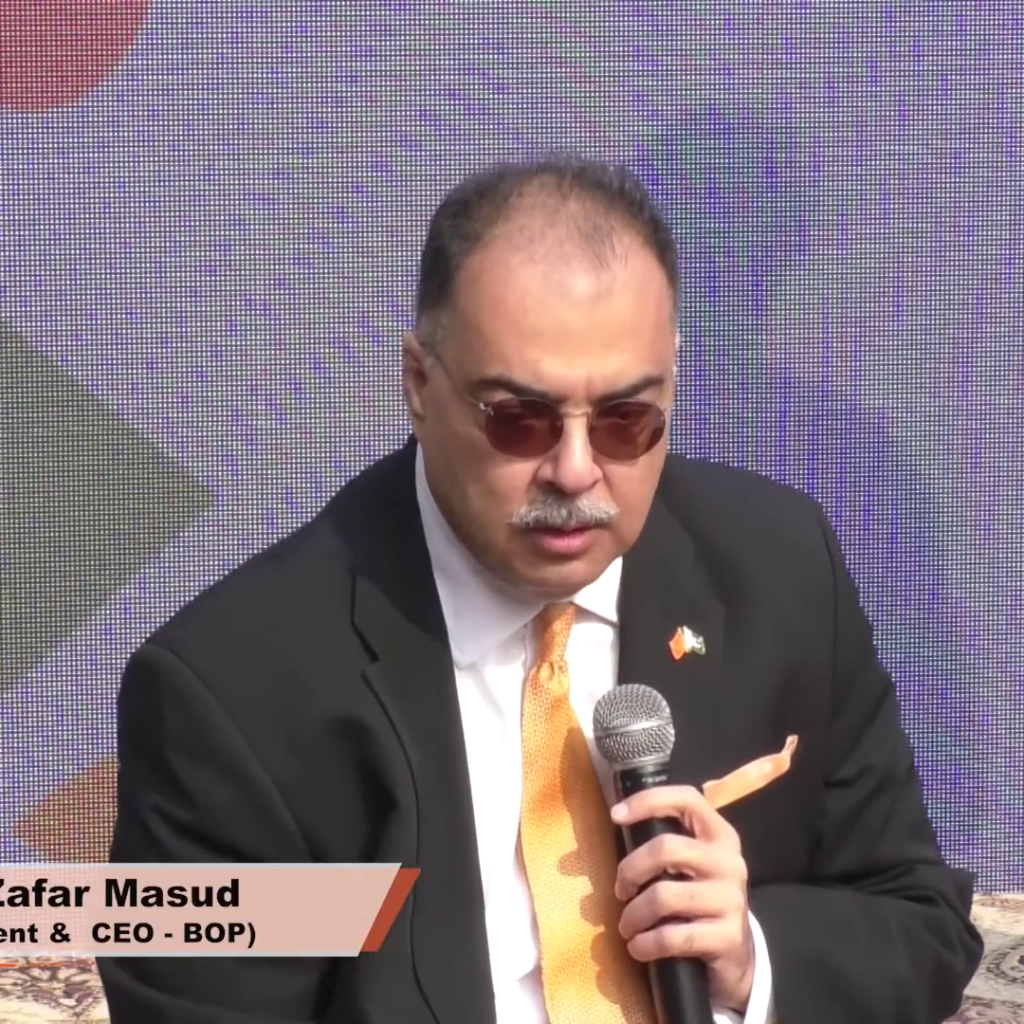Mr. Zafar Masud, President & CEO of BOP, shares insights on the financial ecosystem for the Electric Vehicle EV industry in Pakistan at the Pakistan Electric Vehicle Conference (PEVC) 2024 held in Karachi.
Mr. Zafar Masud calls for a Robust Financial Ecosystem the EV Industry in Pakistan

A recent video featuring Zafar Masud, President of the Bank of Punjab, has shed light on the crucial role of a strong financial ecosystem for the EV industry in Pakistan to accelerate the adoption of electric vehicles (EVs) in Pakistan. Masud’s speech draws on his experiences at the BlueTech Clean Air Alliance in China, highlighting the successful strategies employed there to combat air pollution and promote sustainable transportation.
Masud emphasizes the need for a multi-pronged approach in Pakistan, combining both incentives and regulations to effectively encourage the transition to EVs. He points to China’s success as a model, where a combination of government subsidies, tax breaks, and stringent emission standards has fueled the rapid growth of their EV market.
However, Masud also acknowledges the significant challenges facing nascent EV industry in Pakistan. He specifically addresses the issues of limited consumer financing options and significant infrastructure gaps, particularly the lack of widespread charging infrastructure. These obstacles, he argues, must be overcome to create a viable and attractive market for electric vehicles.
The lack of accessible financing options makes it difficult for consumers to afford the higher upfront cost of EVs compared to traditional gasoline-powered vehicles. This is a major deterrent for potential buyers and needs to be addressed through innovative financing schemes, such as low-interest loans, leasing programs, and government-backed financing initiatives.
Furthermore, the underdeveloped charging infrastructure poses a significant “range anxiety” for potential EV owners. Without a reliable and accessible network of charging stations, consumers are hesitant to make the switch to electric vehicles. Masud stresses the importance of investing in the development of a robust charging network across the country, including public charging stations, home charging solutions, and battery swapping facilities.
Beyond the financial and infrastructural challenges, Masud underscores the critical importance of political will and sustained commitment to drive the EV transition. He argues that government policies, regulations, and long-term vision are essential to create a stable and predictable environment for investment and growth in the EV sector. This includes setting clear targets for EV adoption, implementing supportive policies, and fostering collaboration between government, industry, and research institutions.
Masud’s speech serves as a call to action for stakeholders across Pakistan to collaborate and create a conducive environment for the growth of the EV industry in Pakistan. By addressing the financial barriers, developing the necessary infrastructure, and demonstrating strong political will, Pakistan can unlock the potential of electric vehicles to reduce air pollution, improve public health, and contribute to a more sustainable future. The video highlights the Bank of Punjab’s recognition of the importance of this sector and their potential role in facilitating its growth.
Current State of the EV Industry in Pakistan
EV adoption in Pakistan is in its early stages but is gaining momentum. Here’s a summary of the current state:
Key Points:
- Government Support: The Pakistani government has set ambitious targets for EV adoption, aiming for 30% of passenger vehicles and 90% of two- and three-wheelers to be electric by 2030. They have introduced policies like the National Electric Vehicle Policy (NEVP) to provide tax incentives and promote EV adoption.
- Growing Market: While still small, the EV industry in Pakistan is growing. Registrations increased by 40% between 2022 and 2023, indicating rising interest among consumers.
- Challenges: Several challenges hinder faster adoption:
- High Initial Costs: EVs generally have a higher upfront cost compared to conventional vehicles, making them less affordable for many Pakistanis.
- Limited Charging Infrastructure: The lack of a widespread and reliable charging network creates “range anxiety” and discourages potential buyers.
- Electricity Network Limitations: The existing electricity infrastructure may need upgrades to support widespread EV charging.
- Focus on Two- and Three-Wheelers: Much of the current EV adoption is concentrated in two- and three-wheelers (rickshaws and motorcycles), which are more affordable and suitable for urban environments.
- Local Production: There are efforts to promote local manufacturing of EVs to reduce costs and dependence on imports.
- Private Sector Involvement: Companies like HUBCO are investing in building charging infrastructure, indicating growing private sector interest in the EV market.
Overall:
The EV Industry in Pakistan is showing promising signs of growth, driven by government support and increasing awareness of the benefits of electric vehicles. However, overcoming challenges related to affordability, infrastructure, and electricity supply is crucial for achieving widespread EV adoption and realizing the country’s ambitious targets.